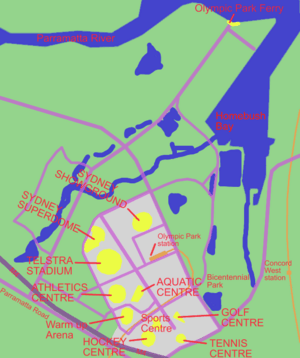Sport in New South Wales facts for kids
Sport is a huge part of life in New South Wales, Australia. People in NSW love to play and watch sports. Some of the most popular sports to play include netball, tennis, and soccer.
New South Wales has also hosted many big international sports events, like the 2000 Summer Olympics in Sydney. When it comes to watching sports, rugby league, rugby union, cricket, soccer, and Australian rules football are very popular.
Contents
Cricket in NSW
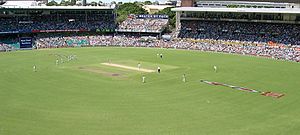
Cricket is one of the most loved sports in New South Wales. The state's team, the NSW Blues, is super successful! They have won the main Australian competition (First-class) 44 times and the One-Day Domestic cup nine times.
Many famous Australian cricketers, like Sir Don Bradman, Steve Waugh, Brett Lee, and Glenn McGrath, started their careers playing for NSW. The NSW Blues play their home games at the famous Sydney Cricket Ground.
For the faster Twenty20 games, New South Wales has two teams in the Big Bash League: the Sydney Sixers (who play at the Sydney Cricket Ground) and the Sydney Thunder (who play at the Sydney Showground).
Snow Sports and Skiing
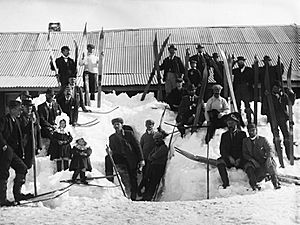
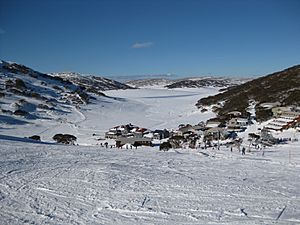
New South Wales is home to Australia's highest snowy mountains, oldest ski areas, and biggest ski resorts. Skiing in Australia began around 1861 in Kiandra, NSW. This happened when gold miners from Norway brought the idea to the snowy hills.
The first ski club in the world, The Kiandra Snow Shoe Club, was formed in Kiandra in 1861. This club is still going strong today! Even though the gold rush in Kiandra didn't last long, the town remained a place for skiing for over 100 years.
Later, skiing in NSW moved south to the Mount Kosciuszko area, which has even better snow. The first chalet (a type of mountain house) was built at Charlotte Pass in 1930. This made it easier to reach Australia's highest mountains. Charlotte Pass is the highest ski village in Australia, at 1760 meters above sea level. You can only get there by special over-snow vehicles in winter!
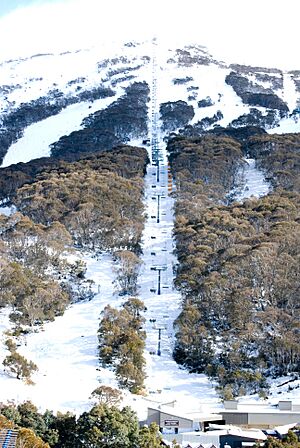
The building of the huge Snowy Mountains Hydro-Electric Scheme from 1949 really helped the ski industry grow. This led to the creation of popular resorts like Thredbo and Perisher.
Today, Thredbo has 14 ski lifts and boasts Australia's longest ski run, which is 5.9 kilometers long! It also has the biggest vertical drop (672 meters) and the highest lifted point in Australia (2037 meters).
In the 1980s, Mount Blue Cow was developed. In 1987, the Skitube Alpine Railway opened, taking skiers from Bullocks Flat to Perisher Valley and Blue Cow. Later, these resorts combined to become the largest ski resort in the Southern Hemisphere. In 2009, Perisher had 48 lifts and covered a huge area of 1,245 hectares!
The Kosciuszko Main Range also offers exciting cross-country and back-country skiing for those who love adventure.
Netball in NSW
Suncorp Super Netball is Australia's top netball league, and New South Wales has two teams in it. The New South Wales Swifts are a well-known club that has been around for a while. Giants Netball was created in 2017 when the Greater Western Sydney Giants football club got a new team in the league.
Other Sports and Events
New South Wales is also home to many other sports teams and hosts exciting events. For example, the Sydney Blue Sox play in the Australian Baseball League. In motorsport, teams like Walden Motorsport and Brad Jones Racing are based in NSW.
Unique horse sports like campdrafting and polocrosse were actually started in New South Wales! Polocrosse is now played in many countries around the world. Rodeos are also very popular events for both riders and spectators. The biggest horse events in the state are held at the Australian Equine and Livestock Events Centre in Tamworth.
Sydney has hosted major international events like the 2000 Summer Olympics and the 1938 British Empire Games. The main Olympic stadium, now called ANZ Stadium, is where the yearly NRL Grand Final (rugby league) is held. It also hosts big rugby league, rugby union, and soccer matches. It even hosted the final of the 2003 Rugby World Cup!
The Sydney Cricket Ground traditionally hosts a big cricket test match every year from January 2nd to 6th. The famous Sydney to Hobart Yacht Race starts in Sydney Harbour on Boxing Day (December 26th). For car racing fans, the Bathurst 1000 is a huge event held at the Mount Panorama Circuit near Bathurst.
The Sydney Autumn Racing Carnival features the world's richest horse race for two-year-olds, the Golden Slipper Stakes, held in April. The Medibank International tennis tournament takes place in January, just before the Australian Open. And if you like running, the City to Surf foot race in August is one of the biggest timed races in the world!
New South Wales Sports Awards
Every year, the New South Wales Sport Awards celebrate the best athletes. The top award is the Sport Star of the Year. Here are some of the winners:
- 1994 Michelle Martin - Squash
- 1995 Michelle Martin - Squash
- 1996 Alyson Annan - Hockey
- 1997 Chris McCormack - Triathlon
- 1998 Ian Thorpe - Swimming
- 1999 Ian Thorpe - Swimming
- 2000 Layne Beachley - Surfing
- 2001 Ian Thorpe - Swimming
- 2002 Layne Beachley - Surfing
- 2003 Layne Beachley - Surfing
- 2004 Petria Thomas - Swimming
- 2005 Kate Bates - Cycling
- 2006 Brad Kahlefeldt - Triathlon
- 2007 Casey Stoner - Motorcycling
- 2008 Matthew Mitcham - Diving
- 2009 Dani Samuels - Track & Field
- 2010 Stephanie Gilmore - Surfing & Tom Slingsby - Sailing
- 2011 Tom Slingsby - Sailing
- 2012 Michael Clarke - Cricket
- 2013 Jessica Fox - Canoe Slalom
Sydney Olympic Park
Sydney Olympic Park is located in the middle of Sydney. It was built for the 2000 Olympics and is now a major sports hub.
The Sydney Superdome is a big indoor stadium that can hold up to 21,000 people for various events.
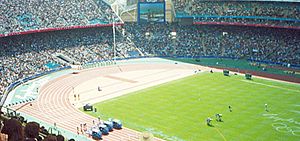
Stadium Australia, also known as ANZ Stadium, is Sydney's largest stadium. It was built for the 2000 Olympics and now hosts huge events like the NRL Grand Final, State of Origin rugby league games, and international rugby union and soccer matches. It's also a home ground for NRL teams like the Canterbury-Bankstown Bulldogs and the South Sydney Rabbitohs.
Sydney Olympic Park also has many other sports facilities, including another indoor arena, a tennis center, an aquatic center, an athletics center, and a hockey center. In 2009, it even hosted a motor race called the Sydney 500 on a special street circuit.
Moore Park Venues
Moore Park is another important sports area in Sydney.
The Sydney Football Stadium was designed for rugby league but is also used for rugby union and soccer. Teams like the Sydney Roosters, the NSW Waratahs, and the Sydney FC soccer team play their home games here.
The Sydney Cricket Ground is mainly used for cricket and Aussie rules football games. It's the home ground for the Sydney Swans (Aussie rules) and the NSW Blues (cricket).
Images for kids
-
RL Pioneers Dan Frawley(r), Dally Messenger(l) in action NSW v Qld 1912
-
Newcastle Jets and Sydney FC at EnergyAustralia Stadium.
-
The Sydney Swans 2006 AFL Grand Final team
 | John T. Biggers |
 | Thomas Blackshear |
 | Mark Bradford |
 | Beverly Buchanan |


